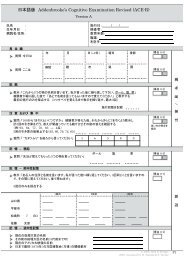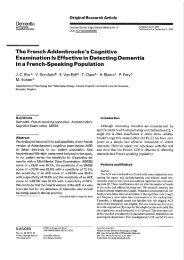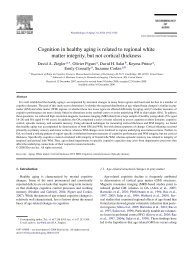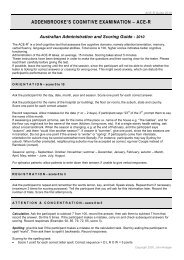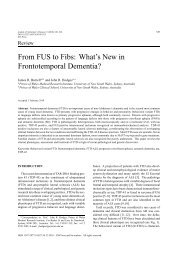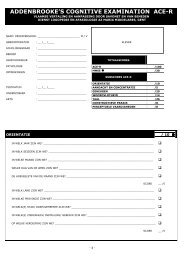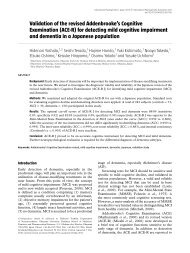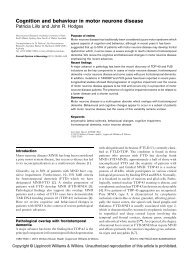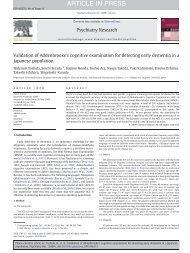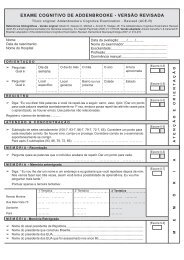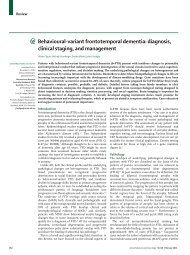FRS Interview Guide
FRS Interview Guide
FRS Interview Guide
Create successful ePaper yourself
Turn your PDF publications into a flip-book with our unique Google optimized e-Paper software.
BEHAVIOUR<br />
<strong>FRS</strong> <strong>Interview</strong> <strong>Guide</strong> www.ftdrg.org<br />
Frontotemporal Dementia Rating Scale<br />
<strong>FRS</strong><br />
<strong>Interview</strong> guide<br />
1. Lacks interest in doing things - their leisure activities, own interests<br />
Which are --- leisure activities?<br />
Does --- need prompting to do his leisure/hobbies activities?<br />
(Is there a decrease in interest? If informant says patient never had leisure activities before check if<br />
they might have had interest in sports on TV, films on TV, reading, etc. Note sometimes there are<br />
changes in leisure activities due to physical disability – here, the aim is to evaluate level of interest. If<br />
activities have declined due to inability to engage in them, prompt for level of interest in what the<br />
patient is still able to do)<br />
2. Lacks normal affection, lacks interest in family members worries<br />
How is --- in demonstrating affection?<br />
Is he/she affectionate to you, or their children?<br />
Does he/she seem concerned about their children/parents?<br />
3. Is uncooperative when asked to do something<br />
When you ask --- to do something, does he/she normally agree or try to do as you asked?<br />
Is he/she difficult to deal with?<br />
If patient is quite impaired, ask if they refuse help<br />
4. Becomes confused or muddled in unusual surroundings<br />
When --- goes out, is he/she generally good at finding their bearings?<br />
If you went to a different shopping centre or visited a friend you don’t see often, would he/she<br />
be ok making his/her way around? Would they be able to find the car again?<br />
Is it better when it is a familiar place?<br />
Has he/she been ever good at orientating themselves – where home is, where the shops are,<br />
north/south, etc?<br />
5. Is restless<br />
Does --- rummage around the house all the time?<br />
Is he/she fidgeting all the time? Or moving their legs, for instance?<br />
(Informant might mention that patient cannot sit still while watching TV, or patient is pacing all<br />
the time)<br />
6. Acts impulsively without thinking<br />
Does --- say or do things in public that might be embarrassing to you or to your children?<br />
Does he/she make comments that might be rude to other people?<br />
Does he/she approach strange people and talk as if they were friends?<br />
Does he/she make rash decisions (e.g. with spending money)?<br />
Have you been concerned about his/her safety when doing activities because they may not be<br />
thought through?
7. Forgets what day it is<br />
Does --- keep track of which day it is, or if it is the weekend?<br />
Does --- use a calendar, or a diary?<br />
Does he/she normally know the appointments of the day/week?<br />
Do you need to prompt him/her about the appointments of the day?<br />
OUTING AND SHOPPING<br />
8. Has problems taking his/her usual transportation safely<br />
(car if has a driver licence; bike or public transport if does not have a driver licence)<br />
Does --- drive? Did he/she use to drive? (if never driven evaluate ability to take public transport,<br />
or ride their bicycles if applicable)<br />
Does he/she take the bus/train on their own?<br />
9. Has difficulties shopping on their own<br />
(e.g. to go to the local shops to get milk and bread)<br />
Ascertain previous level of shopping to determine whether patient can still perform to the same<br />
level..<br />
Does --- do the grocery shopping?<br />
Does --- buy bread and milk at the local shop when needed?<br />
Does --- normally bring home what they had planned/were asked to?<br />
Do they use a shopping list now? Did they used to?<br />
How do they pay: by credit card, cash? (this question can be used later for determining ability in<br />
the finances section)<br />
HOUSEHOLD CHORES AND TELEPHONE<br />
Ascertain if patient was the main person looking after the house, or somebody who had only a<br />
couple of tasks to do<br />
10. Lacks interest or motivation to perform household chores that he/she used to<br />
perform in the past<br />
If female: does --- look after the house like in the past?<br />
Does she need more help than she used to?<br />
Does she need prompting to do those tasks?<br />
If male: which activities does --- do in the house?<br />
Is there an activity he has always done (e.g. ironing; taking rubbish out; mowing the lawn)?<br />
Does he need prompting to do those tasks?<br />
11. Has difficulties completing household chores adequately that he/she used to<br />
perform in the past<br />
When she/he does that task, does he/she do a good job?<br />
Do you need to re-do them later?<br />
12. Has difficulty finding and dialling a telephone number correctly<br />
Bear in mind that patients with Semantic Dementia or PNFA might have trouble using the phone due<br />
to language difficulties, but no difficulty in finding and dialling a number – as seen in patients with<br />
Alzheimer’s disease.<br />
Does he/she use the telephone?<br />
Does he/she avoid answering the phone?<br />
<strong>FRS</strong> <strong>Interview</strong> <strong>Guide</strong> www.ftdrg.org
Does he/she make calls?<br />
FINANCES AND CORRESPONDENCE<br />
Ascertain first if the patient used to be responsible to the finances of the household before symptom<br />
onset. If so, carry out questions regarding finances. If not, still address question 13 but skip question<br />
14. Managing correspondence is addressed in question 15, and the underlying function we are<br />
evaluating is language skills (writing and/or comprehension). As there is a hierarchy of abilities in<br />
managing finances, if patient clearly organises all bills, payments and investments to a high level,<br />
question 16 can be answered based on previous 3 questions and may not need to be probed<br />
separately.<br />
13. Lacks interest in his/her personal affairs such as finances and written<br />
correspondence<br />
Does he/she used to look after the finances? If yes:<br />
Is he/she doing that at the moment? (e.g. paying bills, keeping track of statements, making<br />
investments) Does he/she need some help from you?<br />
If answer is no: Is he/she still interested in knowing how the finances are going?<br />
14. Has problems organising his/her finances and to pay bills (cheques, bankbook, bills)<br />
Is he/she doing that at the moment? (e.g. paying bills, keeping track of statements, making<br />
investments) Does he/she need some help from you/somebody?<br />
(informant might have answered this above)<br />
15. Has difficulties organising his/her correspondence without help (writing skills)<br />
Does he/she deal with letters/emails that need to be replied?<br />
Does he/she need help with spelling, checking what was written?<br />
16. Has problems handling adequately cash in shops, petrol stations, etc<br />
(give and check change)<br />
Does he/she normally pay for shopping, or a coffee with cash or card (credit or debit?)<br />
Does he/she understand the value of the bills?<br />
Does he/she pay with one large bill to avoid calculating?<br />
Is he/she able to check change given and know if it’s correct?<br />
MEDICATIONS<br />
17. Has problems taking his/her medications at the correct time<br />
(forgets or refuses to take them)<br />
Does he/she take any medication at the moment? If no, mark N/A. If yes:<br />
Does he/she need any prompting to take the medication at the correct time?<br />
18. Has difficulties taking his/her medications as prescribed<br />
(according to the right dosage)<br />
Does he/she know how many tablets/pills they should take?<br />
Does he/she use a pill box or Webster packs? If yes, who prepares them?<br />
<strong>FRS</strong> <strong>Interview</strong> <strong>Guide</strong> www.ftdrg.org
MEAL PREPARATION AND EATING<br />
Ascertain first if patient used to be the main cook in the house, an occasional helper, or did not use to<br />
prepare any meals. In this section we evaluate whether the patient needs help to prepare a full meal<br />
(if used to be the main cook), or breakfast/light snack (e.g. used to prepare a sandwich for themselves<br />
but was never responsible for meal preparation). The probes for questions 19, 20 and 21 should be<br />
based on the same task, e.g. preparing a meal, or preparing a sandwich, rather than asking about one<br />
task for initiation and then switch to another task for execution.<br />
19. Lacks previous interest or motivation to prepare a meal (or breakfast/ sandwich<br />
if did not use to cook) or snack for himself/herself<br />
Ascertain previous level of cooking and then score whether patient can still perform to the same<br />
level.<br />
Does he/she prepare something to eat? (e.g. full meal if used to be the main cook, or light<br />
snack such as sandwich, toast, for less proficient cooks)<br />
Does he/she need you to prompt them to prepare?<br />
If patient does not prepare things to eat and never did, go to Q22<br />
20. Has difficulties organising the preparation of light meals or snacks<br />
(ingredients, cookware, sequence of steps)<br />
Does he/she need help while preparing the meal/snacks?<br />
Have they simplified their cooking style (less complex meals)?<br />
21. Has problems preparing or cooking a light meal or snack safely<br />
(needs supervision in kitchen)<br />
Does somebody need to be there while they are cooking?<br />
Do they leave the stove on?<br />
Do they handle the knives well?<br />
22. Lacks initiative to eat<br />
(if not told to, might spend the day without eating anything)<br />
When he/she is hungry, does he get something to eat? (e.g. a piece of fruit, a snack)<br />
Does he/she rely on you to bring something for them to eat?<br />
23. Has difficulties choosing appropriate utensils when eating<br />
Does he/she use the cutlery like they used to use before?<br />
Any problems with fork or knife?<br />
24. Has problems eating meals at a normal pace and with appropriate manners<br />
Is he/she eating too fast or too slow now?<br />
Is he/she putting too much food in the mouth?<br />
Is he/she now a messier eater?<br />
25. Wants to eat the same foods repeatedly<br />
Does he/she have any favourite foods that he/she has to have most of the time?<br />
Which foods are those? (if sweets, score also question 26)<br />
26. Prefers sweet foods more than before<br />
Make sure the patient did not already have a sweet tooth prior to disease onset<br />
<strong>FRS</strong> <strong>Interview</strong> <strong>Guide</strong> www.ftdrg.org
SELF CARE AND MOBILITY<br />
27. Has problems choosing appropriate clothing<br />
(with regard to the occasion, the weather or colour combination)<br />
Ascertain if the spouse might have always laid out the clothes for the patient for the last 20 years. In<br />
this situation, score N/A and go to Q28<br />
When he/she is getting ready for the day, does he/she need help in choosing their clothes?<br />
Does he/she always want to wear the same clothes (even if they are dirty)?<br />
28. Is incontinent<br />
Be aware of carers’ sensitivity to this question. If patient scored never for most of the questions<br />
above, it is highly likely they will score never for question 28 as well.<br />
Does he/she have problems going to the toilet?<br />
Has he/she ever had an “accident” when going to the toilet?<br />
29. Cannot be left at home by himself/herself for a whole day<br />
(for safety reasons)<br />
Be aware of carers’ sensitivity to this question. If patient scored never for most of the questions<br />
above, it is highly likely they will score never for question 29 as well.<br />
Are there times when you go out and he/she stays at home by themselves?<br />
For how long do they normally stay at home alone?<br />
30. Is restricted to the bed<br />
This question does not need asking and can be scored upon observation.<br />
<strong>FRS</strong> <strong>Interview</strong> <strong>Guide</strong> www.ftdrg.org



